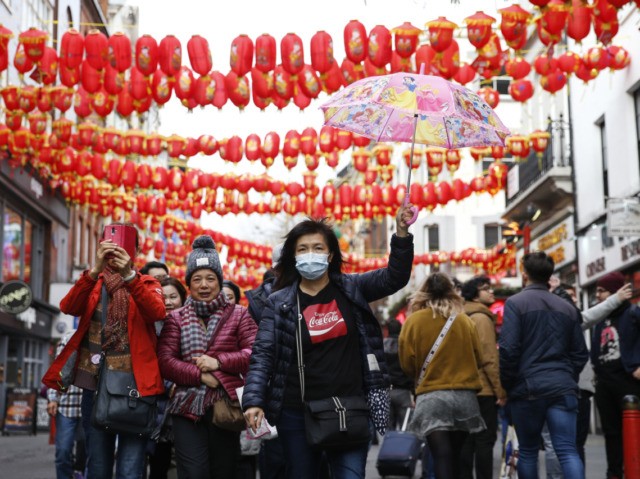The United Kingdom has seen its first confirmed domestic death from coronavirus as the number of known cases doubled in two days to 116.
The first victim was British woman is believed to have been 75 and had been “in and out of hospital” with an underlying health condition. She was diagnosed with coronavirus when NHS staff were conducting routine tests of intensive care patients with respiratory problems for pneumonia. She died at the Royal Berkshire Hospital in Reading, Berkshire, on Thursday.
It is unclear as to how she contracted the China-origin virus, as The Times reports the frail woman had not been travelling nor been in contact with anyone known to have been infected, suggesting that coronavirus is being passed on undetected.
“Our sympathies are very much with the victim and their family,” Prime Minister Boris Johnson told reporters.
A second fatality was reported on Friday afternoon, but there has been no official confirmation. No further details of the victim were released at the time of reporting.
Government officials confirmed that the number of diagnoses had risen to 116, with the chief medical officer Professor Chris Witty saying that the country was entering the next phase of the outbreak and that “planning is now going in full tilt for the delay phase”.
“Where people have very minimal symptoms and we think they are clinically safe and they are able to self-isolate, we think this is actually safer for them as well as more pleasant,” Prof Whitty said.
Prime Minister Johnson has maintained that it was as yet too early to roll out contingency planning such as putting limitations on public gatherings or cancelling sporting events, saying, “you can’t fire your shots too early”.
Italy, by contrast, has become a coronavirus epicentre with every region of the country affected, including a reported case in the Vatican. There are a total of 3,858 confirmed cases of coronavirus in Italy and there have been 148 deaths, as at the time of reporting.
Earlier this week, Mr Johnson outlined a range of measures the government will undertake should the outbreak worsen. At present, the prevailing advice is to wash your hands and to carry on as usual. But those who have been to Italy in the past two weeks and who feel unwell have been told to call the NHS medical advice hotline 111 and self-isolate for a fortnight.
Matt Hancock, the health secretary, told BBC Question Time that in the event of a serious outbreak there would be no disruptions to the food supply chain, but urged people not to panic buy in bulk.
But the government is said to be “looking at” isolating whole households in further action if the outbreak worsens, the government’s chief scientific officer Sir Patrick Vallance told Sky News. Sir Patrick said that while coronavirus is “very infectious” and “more dangerous than flu”, “for 98 to 99 per cent of people, this is going to be a mild illness.”
The virus is described as being more deadly for the elderly than the very young; however, Prof Whitty said that the odds of survival for affected seniors is still very strong, highlighting the 15 per cent death rates for those over the age of 80 in China.
Various media reports drew attention to the fact that while the mortality rate for coronavirus is around two per cent — higher than the seasonal flu or norovirus — it was lower than the mortality rates for other infections including SARS (9.6 per cent), MRSA (20 per cent), MERS (45 per cent), and Ebola (50 per cent).

COMMENTS
Please let us know if you're having issues with commenting.